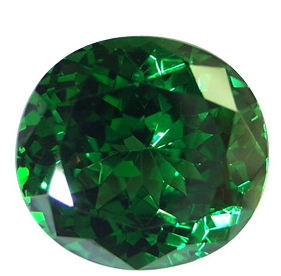 Years ago a first time client asked me to identify the green gemstone she was wearing.
Years ago a first time client asked me to identify the green gemstone she was wearing.
When she asked, she was considering buying an ivory necklace–legal back then–from me. Whether or not she consciously framed it in this way to herself, the request was a test. Did I know gemstones? Was she buying from an expert or from an amateur? Could she be comfortable with what I was telling her about the ivory?
It wasn’t hard to identify the stone as a tsavorite. It was small, under a carat, a deep forest green and it was bright, far brighter than an emerald.
She had just bought the gemstone and was proud of it. It was important to her that I recognized the stone, understood its rarity and knew its source. She may have bought the ivory anyway, but she went on to become a client for many years, a development directly tied to the fact I was able to recognize a relatively rare gemstone. And, not only did she take my advice on jewelry she bought from me, she asked my advice on jewelry she bought from others. That’s because she trusted me.
The Reassurance Clients Need
When we sell jewelry, whether they recognize it or not, clients often impose a test. Usually the test isn’t as direct as the one cited above. Instead, the test comes in the form of a need for reassurance. At its most basic the client wants to be reassured we are honest. For people reading this, I assume that’s not an issue, but I would point out that a reputation for honesty really is priceless.
Clients also want to be reassured we know what we are selling. I can’t stress this enough. Clients want to know about the materials used in the jewelry. Is the amber reconstituted? Is the turquoise treated? Is it lapis or dyed howlite? Clients are rarely put off by knowing a piece is treated. What will put them off is learning the gemstones are treated after the sale has been made. Back when I ran a gallery that showed studio jewelry, I was frequently surprised and frankly, irritated, by artisans who showed me work that included materials they couldn’t describe. Metalsmiths and pearl and bead stringers would choose a material for its design impact and not take the time to identify the gemstone which was often just as simple as asking the dealer.
In addition to knowing about the materials, that is the gemstones and metals used, clients also often want to know how the piece was manufactured. As manufacturers, pearl and bead stringers should be able to discuss the materials they’ve used and why they made a specific manufacturing decision.
Beyond the Basics
So, honesty and product knowledge are foundational for sales. But there is another level, often ignored by many people in the trade, that can contribute in a substantive way to sales. And that is overall industry knowledge.
In general, people who buy jewelry, love jewelry and they are interested in a host of subjects relating to it. If you sell your jewelry, you’ll find yourself fielding questions about trending topics, for example, the recent controversy over tungsten carbide wedding bands. And you’ll also find clients asking time tested questions such as telling the difference between real and fake pearls and whether the tooth test is reliable.
Some, like the client I mentioned above, will ask you to react to jewelry he or she is wearing or has just bought.
This isn’t to suggest that you try to know everything about the industry. You can’t. And if you don’t know the answer to a specific question, just say so. I know, for example, I disappointed clients when I failed to recognized the names of specific — usually commercial — jewelry designers, an area I was and am not especially interested in.
But I did make the effort to stay abreast of industry news and I made it my business to know the characteristics of every gemstone I sold.
It wasn’t hard. After all I love jewelry.
If you are a pearl and bead stringer who sells your jewelry, take my advice. Provide important reassurances to clients by guarding your reputation for honesty, knowing your gemstones and staying up on industry developments. Then share your expertise.

